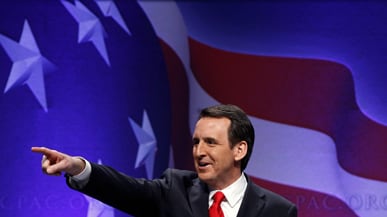Let’s talk about Tim Pawlenty. No, really! Come back! The former Minnesota governor might not be the most exciting candidate in the field, but he’s still got a good chance of capturing the GOP nomination for president in 2012.
Put together a steady record of fiscal conservatism, social conservatism, success in a purple state, and executive experience, and you should get a formidable candidate. But so far, Pawlenty has struggled to gain name recognition and stature in polls. Some of that will change Monday, when he officially launches his campaign. But political watchers and GOP insiders say he can win. Here are the five steps toward a TPaw triumph.
1. He Must Make a Virtue of Boredom
Have we mentioned that Pawlenty isn’t the most incendiary, charismatic candidate? “The words ‘passion’ and ‘Tim Pawlenty’ don’t often occur in the same sentence,” cracks Stu Rothenberg, editor of The Rothenberg Political Report. But while Pawlenty might not lead a youth movement, as Barack Obama did, his views can be appealing to Republican primary voters and caucus-goers. “They think he’s dull today, but as he articulates his view, he’ll come off as a solid conservative,” says Ed Rollins, a Republican strategist who managed Mike Huckabee’s campaign in 2008. The Obama comparison could be instructive: While the candidate’s charisma whipped voters into a frenzy, many Americans have been disappointed in the president. Likewise, there’s seldom a dull moment with Newt Gingrich, but some see the former House speaker’s campaign splitting at the seams over its lack of discipline. Think of the early campaign as flirtation and the primaries as engagement; it’s a variation on the rule that one should date bad boys or girls and marry good ones. “At a moment when people are really rather fed up with what they think they’re being given or sold by their leaders, sell what you got,” says Stephen Hess, a senior fellow at the Brookings Institution who served in the Eisenhower and Nixon administrations. “The important part really is that you don’t make this man into something he’s not.”
2. He Must Win Over the Evangelicals
Huckabee’s decision not to run will have far-reaching effects, but the early consensus is that his exit is a boon to Pawlenty more than anyone. Iowa’s caucus base is more socially conservative than many in the country, and Huckabee—with his strong support among evangelical Christians—won the state in 2008. With him out of the way, Pawlenty’s well-positioned to snap up that vote: Evangelical voters remain skeptical of Mitt Romney and Jon Huntsman’s Mormonism and Gingrich’s three marriages; and Rick Santorum hasn’t made much of a splash yet. But Pawlenty’s fellow Minnesotan Michele Bachmann, as well as perpetual will-she-won’t-she candidate Sarah Palin, could steal them away.

3. He Must Hold the Line on Policy
Already, Pawlenty has found himself apologizing for his record as governor. Back in 2007, he put himself on the record advocating for a cap-and-trade policy to deal with climate change. Since then, that position has become so toxic that even Democrats are skittish (see Joe Manchin’s 2010 Senate ad, in which he takes aim at it). During the first GOP debate on May 5, Pawlenty apologized clearly and profusely: “I’ve said I was wrong. It was a mistake, and I’m sorry… I just admit it. I don’t try to duck it, bob it, weave it, try to explain it away. I’m just telling you, I made a mistake.” That’s the right path, Rollins says. “The public is more than willing to accept an admission of mistake,” he says, adding, in a thinly veiled swipe at Romney: “as opposed to someone who’s out there doing what their pollsters want them to do.” Pawlenty’s reversals are far fewer and less heretical than Romney (on an individual mandate for health care) or Gingrich (most recently, on whether he’d vote for Paul Ryan’s budget plan). If Pawlenty can stick to his guns, he’ll appear more consistent and courageous than his opponents.
4. He Must Let His Campaign Do the Heavy Lifting
So Pawlenty’s not a ball of fire. But he’s a smart boss. In April, he managed to snag Nick Ayers, a wunderkind in Republican circles who served as executive director of the Republican Governors Association and was highly sought as a manager in this cycle. (This hasn’t been a good week for Ayers—a video of him being arrested for DUI surfaced—but it’s likely to pass.) Pawlenty’s also got Vin Weber, a notoriously smart former Minnesota congressman, in his corner. What they do behind the scenes could have as much impact on the primaries as what Pawlenty does.
5. He Must Stay Quiet and Consistent
Above all, Pawlenty needs to play a patient waiting game. Jonathan Bernstein and E.J. Dionne, both writing in The Washington Post, have described it as the Dukakis strategy. In 1988, the Massachusetts governor was quiet and consistent, as Joe Biden (speech plagiarism scandal), Jesse Jackson (too radical), Gary Hart (sex scandal), and others got bruised and bloodied. In short, Pawlenty might not be the most amazing candidate, but if he’s consistent and reliable, and everyone else self-destructs, he may still be standing when the dust clears. “I think he gets the nomination by being everybody’s second choice,” Rothenberg says. “Most football teams don’t go into the Super Bowl and say, ‘We’re not all that good, but we’re good enough.’ But sometimes they do say, ‘We’re going to play really good defense, we’ll let the other teams make mistakes, and we’ll capitalize.’”
It’s a bit risky. Romney looks strong in New Hampshire, the first primary of the season, even though his chances in Iowa look very slim. If Romney gets too much momentum coming out of the Granite State, Pawlenty may never make it out of the second-place slot. With decent fragmentation, though, voters (and donors) may start to question Romney’s resilience and start looking harder at Pawlenty. “There will be a conservative alternative that emerges after three or four of these events,” Rollins says of the straw polls and early primaries, adding that Pawlenty should do well in debates.
What about his weak name recognition? He’s still near the bottom of the pack. There’s nothing to be done about that: While candidates like Huntsman are getting breathless press attention, Pawlenty’s been in the race for months, for all intents and purposes, so there’ll be no splash. But his long windup also has given time for his team to build an operation, prepare for a long season, and raise money. “He understands the game is a marathon, and it isn’t a sprint,” Rollins says. “The guy in the middle of the pack doesn’t get any attention—until the end of the race when he suddenly takes the lead.”
Of course, getting the Republican nod isn’t the same as booking tickets to 1600 Pennsylvania Avenue. “We’ve had plenty of boring candidates,” Hess says. “I can’t remember the last one to win the presidency, though.”
David Graham is a reporter for Newsweek covering politics, national affairs, and business. His writing has also appeared in The Wall Street Journal and The National in Abu Dhabi.






